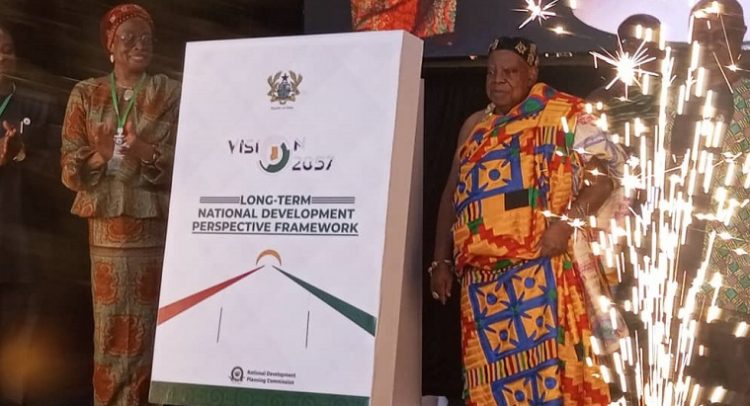Dignitaries in a group photograph at the launch
The National Development Planning Commission (NDPC) has launched ‘Vision 2057: Long-Term National Development Perspective Framework’, a vision document that embodies the development aspirations of the people of Ghana.
This document outlines current and future medium-term development plans, encompassing social, economic, and environmental development goals to be achieved by 2057.
Speaking at the launch, Chairman of NDPC, Prof. George Gyan-Baffour stated that the establishment of the Commission under the 1992 Constitution laid the foundation for a comprehensive approach to development planning, culminating in the introduction of long-term development frameworks such as Ghana Vision 2020.
This includes the long-term national development plan of Ghana from 2018 to 2057, Ghana at 100, and the subsequent coordinated programmes of economic and social development policies of various governments.
“Now, with Vision 2057, it charts the bold course towards a brighter future, guided by lessons learned from past experiences and informed by global commitments, such as the Sustainable Development Goals, the Paris Agreement on Climate Change, AU Agenda 2063, CUMEEN-Montreal Global Biodiversity Framework, the Sendai Framework on Disaster Risk Reduction, and indeed ECOWAS Vision 2050,” he said.
Prof. Gyan-Baffour said the long-term national development perspective framework provides a roadmap for achieving our collective aspirations, setting forth integrated socio-economic development goals and targets to be realised by the time Ghana celebrates its centenary in 2057.
He added that the Commission has concluded that rigid plans prescribing projects, programmes, and actions will not survive under the current political dispensation.
Director-General NDPC, Kodjo Esseim Mensah-Abrampa said the eight chapters Vision 2057 framework is a very useful technical document, as it is very informative to aid in the development of the country.
Emphasising Emergency Preparedness and Resilience, Mensah-Abrampa indicated that this dimension includes building national resilience to disasters, minimising Ghana’s hydro-meteorological threats to safeguard the country against natural threats, and ensuring public safety from hazardous substance pollution among other threats.
For the dimensional goals to be attained, he called on stakeholders to commit to the realisation of the framework to achieve the goals.
BY Prince Fiifi Yorke


